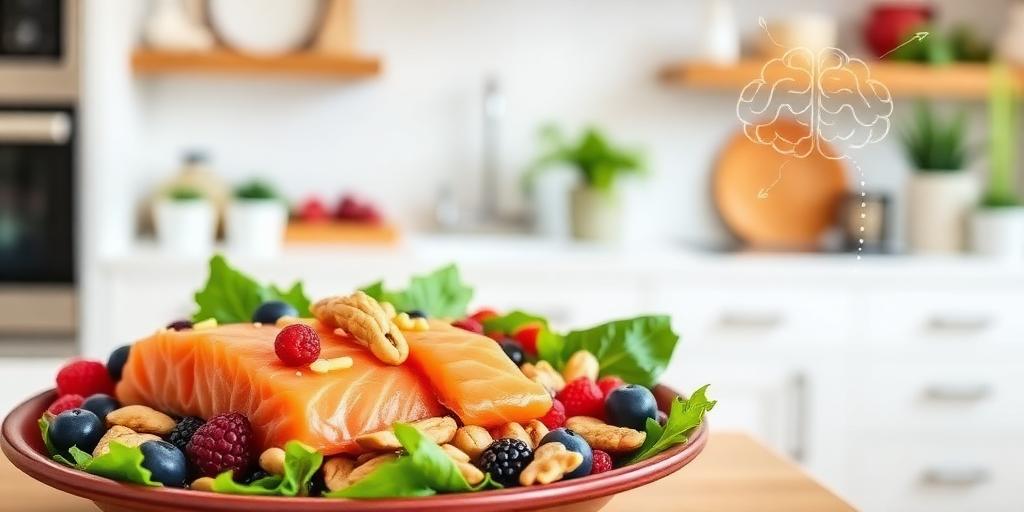Nutrition for Mindset: Eating for Mental Fitness
In today's fast-paced world, mental fitness is just as important as physical fitness. While exercise and mindfulness often take center stage, nutrition plays a vital, yet sometimes overlooked, role in shaping our cognitive functions, mood, and overall mental well-being. This post explores the crucial link between nutrition and mindset, offering insights into how strategic eating can enhance your mental performance.
The Gut-Brain Connection
The gut-brain axis is a bidirectional communication system linking the central nervous system (CNS) with the enteric nervous system (ENS) in the gastrointestinal tract. This connection means that what you eat directly impacts your brain function and vice versa. A balanced gut microbiome is essential for producing neurotransmitters like serotonin, dopamine, and GABA, which regulate mood, motivation, and anxiety.
Key Nutrients for Mental Fitness
Omega-3 Fatty Acids: Found abundantly in fatty fish (salmon, mackerel, tuna), flaxseeds, and walnuts, omega-3s are crucial for brain health. They help reduce inflammation, improve neuron communication, and support cognitive functions. Studies show that adequate omega-3 intake can lower the risk of depression and anxiety.
B Vitamins: Vitamins B6, B9 (folate), and B12 play a pivotal role in neurotransmitter synthesis and nerve function. Deficiency in these vitamins can lead to mood disorders, cognitive decline, and fatigue. Good sources include leafy greens, eggs, legumes, and fortified cereals.
Magnesium: This mineral is involved in over 300 enzymatic reactions in the body, including those that affect brain function. Magnesium helps regulate stress hormones and improves sleep quality. Foods rich in magnesium include spinach, nuts, seeds, and dark chocolate.
Antioxidants: Berries, dark chocolate, and leafy greens are packed with antioxidants that protect the brain from oxidative stress caused by free radicals. Oxidative stress can damage brain cells and impair cognitive function. Incorporating antioxidant-rich foods into your diet can enhance memory and focus.
Probiotics: These beneficial bacteria support gut health, which, as mentioned earlier, is directly linked to brain health. Fermented foods like yogurt, kefir, sauerkraut, and kimchi are excellent sources of probiotics. They can improve mood and reduce symptoms of anxiety and depression.
Foods That Can Hinder Mental Fitness
Processed Foods: High in sugar, unhealthy fats, and artificial additives, processed foods can disrupt the gut microbiome, leading to inflammation and mood swings. They often lack essential nutrients necessary for optimal brain function.
Excessive Sugar: Sugar provides a temporary energy boost, but it can lead to energy crashes, mood instability, and increased anxiety over time. High sugar intake is also linked to a higher risk of depression.
Artificial Sweeteners: Some studies suggest that artificial sweeteners can negatively impact the gut microbiome and cognitive function. While more research is needed, it's wise to consume them in moderation.
Alcohol: While a glass of wine might seem relaxing, alcohol is a depressant that can disrupt sleep patterns and impair cognitive functions. Chronic alcohol consumption can lead to long-term brain damage.
Practical Tips for Eating for Mental Fitness
Plan Your Meals: Planning ensures you consume a variety of nutrient-dense foods and avoid impulsive, unhealthy choices.
Read Food Labels: Be aware of hidden sugars, unhealthy fats, and artificial additives in processed foods.
Stay Hydrated: Dehydration can lead to fatigue, brain fog, and mood disturbances. Aim to drink at least 8 glasses of water per day.
Listen to Your Body: Pay attention to how different foods make you feel. Keep a food journal to identify patterns and make informed choices.
Consult a Professional: A registered dietitian or nutritionist can provide personalized advice based on your specific needs and health conditions.
Conclusion
Nutrition is a cornerstone of mental fitness. By prioritizing nutrient-dense foods and avoiding harmful substances, you can significantly enhance your cognitive functions, mood, and overall mental well-being. Embrace mindful eating, nourish your gut, and watch your mindset flourish. Eating for mental fitness isn't just a diet—it's a lifestyle choice that empowers you to lead a healthier, happier, and more balanced life.









